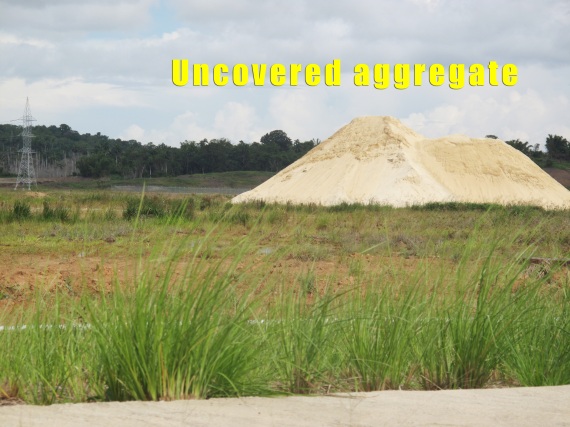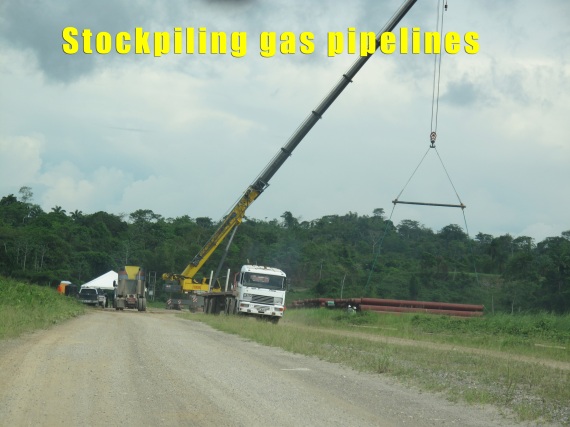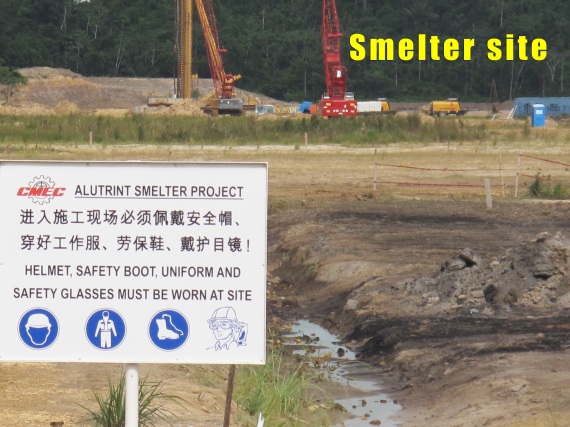Please refer to this article from Trinidad’s Express
Posts Tagged ‘Trinidad and Tobago’
20 May
The Book- Be Smelter Smart
Dear Readers,
Please click on the link below for an electronic version of the book Be Smelter Smart by Dr. Wayne Kublalsingh.
27 Nov
Mr Prime Minister we are approaching six years since the forested hills and clean rivers behind our homes were bulldozed…
The Right Honourable Prime Minister 26th November, 2009
Of The Republic of Trinidad and Tobago,
Mr. Patrick Manning.
Dear Sir,
We have come here today to deliver this letter to you personally, to ask you to please kindly facilitate us with a speedy relocation process at least before the coming dry season in which we suffer.
We write on behalf of most of the residents of Square Deal Corner, Vessigny Village La-Brea, to seek your intervention in a matter of great discomfort to our families and our community with respect to the “buffer zone” at the Union Industrial Estate. Of the total number of residents to be relocated from the buffer zone, there are seven households in Sobo, and the majority resides at Square Deal, most of whom we represent.
The dry season is coming very soon, and each year we have suffered dust storms which run over the grass-less bulldozed surface of the Union Industrial Estate and stifle us daily. Many of our children are coughing all of the time. At most times our homes are dusty, with frequent equipment failure. Our lives are very uncomfortable.
Sir, our humble community of close neighbors’, our fruit trees and vegetable gardens and our homes are where we live, and have grown to love, and it is sad that we have been so completely neglected, and left to live downwind in daily dust storms year after year. Sir, there have been a rise of illnesses especially with children and the elderly such as rashes, emotional trauma and sleeplessness, respiratory illnesses all due to the excessive and unbearable dust, light and noise
Please help us by putting our relocation issue on the front burner with due consideration for the stress which we have endured. Mr Prime Minister we are approaching six years since the forested hills and clean rivers behind our homes were bulldozed. There are many families who complain daily about respiratory problems, and all we ask of you Sir is that you consider our discomfort and the insecure condition in which we have been left to live, without the clearance to improve our lives and residences while we await this fated relocation.
Why are we forgotten? Why is there this delay? There are many precedents of how the relocation issue can be handled. The community in the buffer zone in Point Ligoure and Beach Road Point Fortin are an example of how the relocation exercise could be conducted. Why are we being treated worse than them? Should we not at least expect to be treated equally?
Please be friendly to us and understand that we are in need of your kind favour. We ask that you please facilitate an urgent meeting between our lawyers so that we can be relieved of another year of living in the coming dry season dust clouds.
We respectfully await your urgent response, and remain
Forever yours in fair treatment,
………………………………………….
Leon and Abigail Modeste.
13 Square Deal Corner,
Vessigny Village,
La Brea.
11 Oct
“New Aluminum Smelters outlawed in China till 2012: Bad Economics!”
Submitted by Dr Peter Vine
From The Times (UK)
October 1, 2009
Beijing moves to halt growth as supply starts to outstrip demand
Leo Lewis, Asia Business Correspondent
The Government of China has launched an attack on overcapacity in its heavy industries with a series of stinging curbs on new factories, smelting plants and port-building projects.
The government crackdown, unleashed a day before the country enters a ten-day holiday to celebrate the communist revolution, comes amid rising fears that China’s economy may be blundering into a destructive boom-bust cycle.
In a stark admission yesterday that the recent state-backed investment binge may be swelling out of control, Beijing warned that banks and jobs were being jeopardised by “chaotic over-expansion” in a range of sectors.
Despite the apparent buoyancy of the economy, and its lightning scramble out of the global financial crisis, deep sensitivities remain. For political reasons, Beijing is eager to keep GDP growth above the level of 8 per cent supposedly required to maintain social stability and job creation. But there are fears that huge imbalances between production capacity and actual demand could lead to price wars, corporate failures and severe setbacks for the country’s stellar expansion trajectory.
The government statement included a direct swipe at provincial authorities and what it identified as slack controls on spending and deliberate flouting of planning guidelines. “Some regions act illegally, give approvals in violation of regulations or allow building before approval is granted,” said a message on the Chinese Cabinet’s website.
Under the terms of Wednesday’s onslaught against industry, the building of new steel plants and the expansion of existing facilities were slapped with indefinite bans. Similar restrictions were placed on any impending plans for cement, glass and coke factories. China will not allow any new aluminium smelting plants to be built before 2012, said the official statement, and no new docks are to be built anywhere in the country over the same period.
China’s State Council calculates that the impact of this year’s 140 billion yuan (£13 billion) investment spree in steel mills will be to lift overall national production capacity some 40 per cent above the country’s entire annual demand. The same dynamics reportedly apply to cement.
Heavy polluters took the full force of the government hammer-blow, but even industries with exposure to the so-called “green” economy were not spared. Producers of polysilicon, the raw material for making solar panels, and makers of wind turbines were also told their activities would be far more tightly regulated. “Backward” industries will be forced to raise their game and meet higher efficiency standards.
In the absence of such controls, said the statement from the Chinese Cabinet, “it will be hard to prevent vicious market competition and to increase economic benefits, and this could result in facility closures, layoffs and increases in banks’ bad assets.”
The draconian move follows more than six months of record-breaking bank lending and the disbursement of 4 trillion yuan in government stimulus money. Cumulative new bank lending in the first half of 2009 amounted to more than $1.1 trillion, and some argue that a substantial proportion of this found its way towards the property and stock markets and is fuelling a bubble that may also prove unsustainable. The astronomical levels of corporate investment, warn senior economists, place the booming Chinese economy at increased risk of a sudden collapse in growth.
At the very least, the unprecedented flood of liquidity is expected to create a bad loan crisis in large parts of corporate China, which may eventually force state-owned banks to write off billions.
Paul Sheard, chief global economist at Nomura, warned in a note to investors that the high contribution of investment to China’s GDP figures poses potentially serious challenges to growth. “By offsetting the export-led downturn by spurring domestic demand,” he explained, “China is doing its bit for the long-awaited ‘global rebalancing’ ”. He added that because the economy was investment-inten- sive to start with, engineering a surge in infrastructure, and hinterland-focused, spending is making it even more so. That raises the longer-term risk of growth being hit by an investment-led slump.
10 Sep
What is the Cost of this Aggregate?

Uncovered Aggregate
Photo courtesy Dr Peter Vine, Rashad and Aruna Ali, Abigail and Leon Modeste
8 Sep
What is the Cost of Stockpiling Gas Pipelines?

Stockpiling Gas Pipelines
Photo courtesy Dr Peter Vine, Rashad and Aruna Ali, Abigail and Leon Modeste
5 Sep
Symposium -The Economics of Alutrint
Symposium
The Economics of Alutrint
St Mary’s College
Pembroke St Entrance
Saturday 12th September 2009
9:00 am to 1:00 pm
Chair: Professor Patrick Watson
Contributions: Ms Mary King, Professor Dennis Pantin,
Mr Reg Potter
and others
For all officials in the energy industry, state officials,
students, media, members of the public
LUNCH PROVIDED
29 Aug
Call for Accurate Data
“Dear Friends,
This is an urgent plea for help in Saving the Claxton Bay Mangrove and
to bring some international awareness to prevent the construction of
the aluminium smelter Alutrint. Those in authority are openly defying
the courts of this land. The high court ruled against the Certificate
of Environmental Clearance granted by the EMA to Alutrint.”
DATA AND FACTUAL ACCURACY are keys to understanding the viability of the Alutrint smelter and the NEC port and Essar Steel mill. The state, the professional, the public official must not hide from the public accurate data on these projects. Dr Ahmad Khan, a client of the National Energy Corporation, has written a plea that our Blog on Alutrint, devoted to calling for economic transparency on this project, and our petition to Save the Mangrove at Claxton Bay, publish factual data. He quoted from the above email, circulated locally and internationally, stating that it contains inaccuracy. Here are factual data relevant to this e-mail:
1. The blog on the economics of Alutrint records that officials of the Natural Gas Export Task Force, the Ministry of Finance, the Auditor General, the Minister of Energy, the Environmental Management, the National Energy Corporation, the National Gas Company and Alutrint itself have denied numerous opportunities to disclose the cost and benefits of Alutrint. Officials, including Professor Ken Julien, one of the key architects of Alutrint, his son Philip Julien, who has worked with Alutrint from its inception, as Project Manager and now as Acting Chief Executive Officer, have refused to appear before Parliament to answer questions on the finances and economics of this proposed smelter. Letters, freedom of information requests, invitations on many media programs have been issued to all these state officials, calling for the accounting sheet of Alutrint. Alutrint is breaking the law by refusing to publish its audited accounts annually.
2. The Prime Minister of Trinidad and Tobago, one of the key architects of the Alutrint smelter, is openly defying the High Court by continually declaring that the smelter will continue. The court has revoked the certificate awarded by the State to Alutrint. The matter is now in the hands of the Appeal Court. This matter will be heard in the Court of Appeal, before three judges, beginning September 21st 2009. Other possible breaches of the High Court order are being submitted in affidavit formats to the relevant authorities.
3. The National Energy Corporation port and associated Essar Steel mill proposed for Claxton Bay would have permanent negative impacts on the mangrove system, the seabed, the fishing industry, and the health of the residents. With respect to the mangrove system, according to statistics from the Environmental Impact Statement, a dual-carriage roadway, 100 meters wide by 425 meters long will pass through the existing mangrove. The cumulative impact of all port associated activities – the continual dredging of the sea floor to a depth of 40 feet, the thousands of tons of steel dust emitted by the proposed mill, the loading and transport of 5,040,000 tons of unconsolidated iron ore annually, the concreting of 22 acres of fishing grounds and seagrasses – will have a permanent destructive impact on the Claxton Bay Mangrove System.
4. The economics of the Alutrint smelter and the proposed port and steel mill are of significant concern to both the blog on Alutrint and the Save the Mangrove petition. The public are the ultimate shareholders of all three projects. What are the factual economic costs of these projects? And what are the benefits to our economy? What remuneration, for example, has NEC clients collected from the production of Environmental Impact Statements for the proposed smelter and related facilities, the steel mill and the port? This too must be reflected in the accounting sheets of all these projects. We shall be glad to publish these figures if they become available to us.
Wayne Kublalsingh
Submitted by Rhea Mungal
27 Aug
Why the smelter makes no sense
The following article appeared in the Trinidad Express Wednesday 26th August 2009. The link is given.
http://www.trinidadexpress.com/index.pl/article_opinion?id=161522074
Why the smelter makes no sense
Letter of the Day
Monday, August 24th 2009
Trinidad Express Newspaper

Do those entrusted to steer an even path in our development have the capacity to make sound judgements? If someone was the beneficiary of an unearned fortune, would it be wise to put it in the hands of someone who knows nothing of finance or who has had no experience in earning an income or even working in a parlour?
Some of us may recall the lavish expenditure with borrowed money in the 70s which led to the IMF intervention. When we borrow money on speculative future earnings we are repeating our history.
The public should be aware that the Budget does not finance all these mega projects and we are in hock for years to come. The smelter plant is one project that will be the downfall of our nation.
Firstly there are smelter plants closures all over the world. In Suriname where there is bauxite and hydro power in abundance, the plant was closed after five years of operation because it was uneconomical. In China, Iceland and several countries with massive land space plants have closed. In Jamaica two of the five bauxite mines have been shut down.
Smelter plants require an abundance of water and electric power. In a nation of less than 1.5 million there are over 60 per cent without pipe borne water and in 2009 there are regular outages in the capital city of Port of Spain
As there is no bauxite in Trinidad the alumina will be transshipped and a special port with the necessary silos will be needed. Medical facilities for both health and accident purposes will be required
There is no fast flowing water currents in the Gulf, hence our marine life will be subjected to pollution. The cost for construction is US $400 million loan from China with years of moratorium with interest at two per cent for 25 years. The desaI plants, power generating plant, harbour, medical facilities etc cost another US$l billion.
In real money TT$8.4 billion plus interest divided by 20 years the infrastructure maybe would cost the nation TT$0.5 billion per annum plus operational costs.
Added to this Petrotrin has a similar cost for its upgrade.
In 1984 and again in 1996 the area planned for the smelter was deemed unstable for heavy industry by the World Bank, foreign and local experts.
William Dalton-Brown
Submitted by Wayne Kublalsingh.
Posted by Rhea Mungal
26 Aug
How did it cost to make these signs?

Smelter site
Photo courtesy Dr Peter Vine, Rashad and Aruna Ali, Abigail and Leon Modeste








Comments